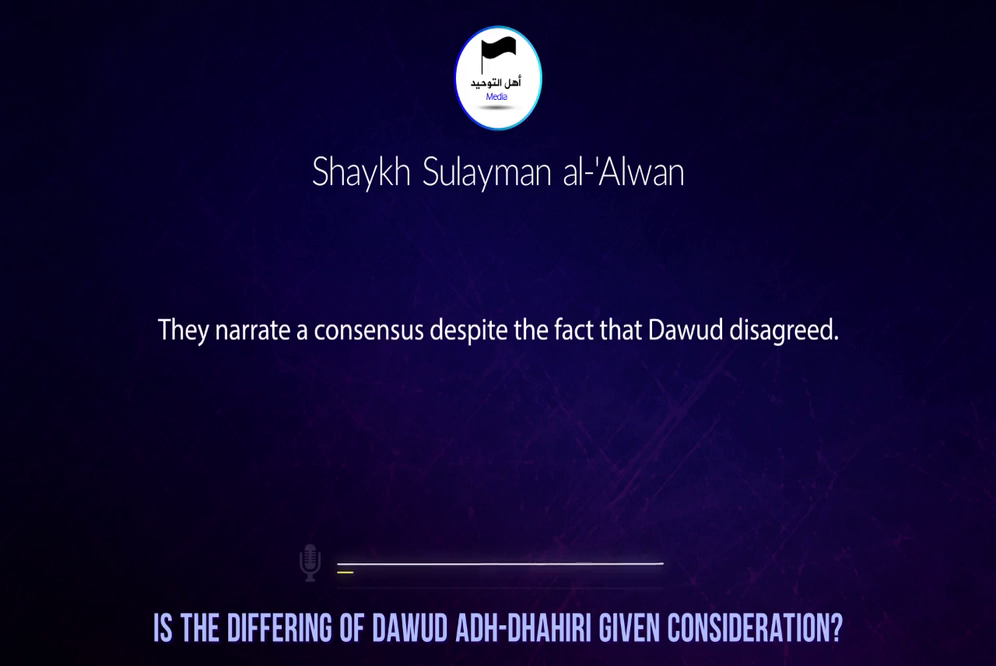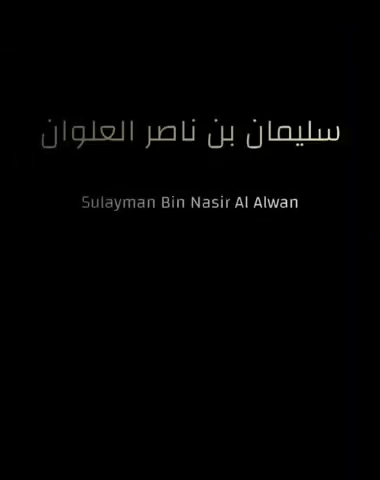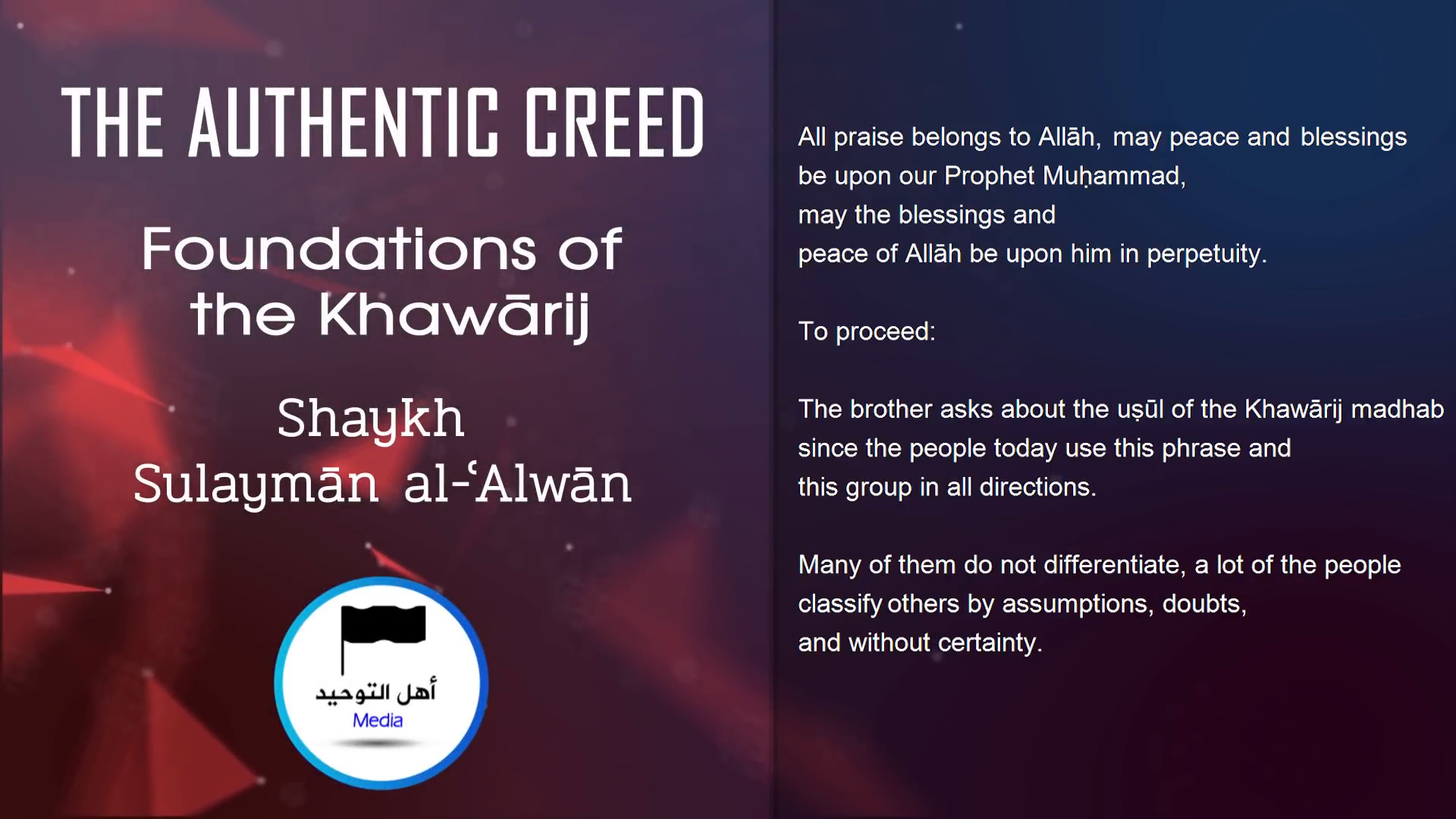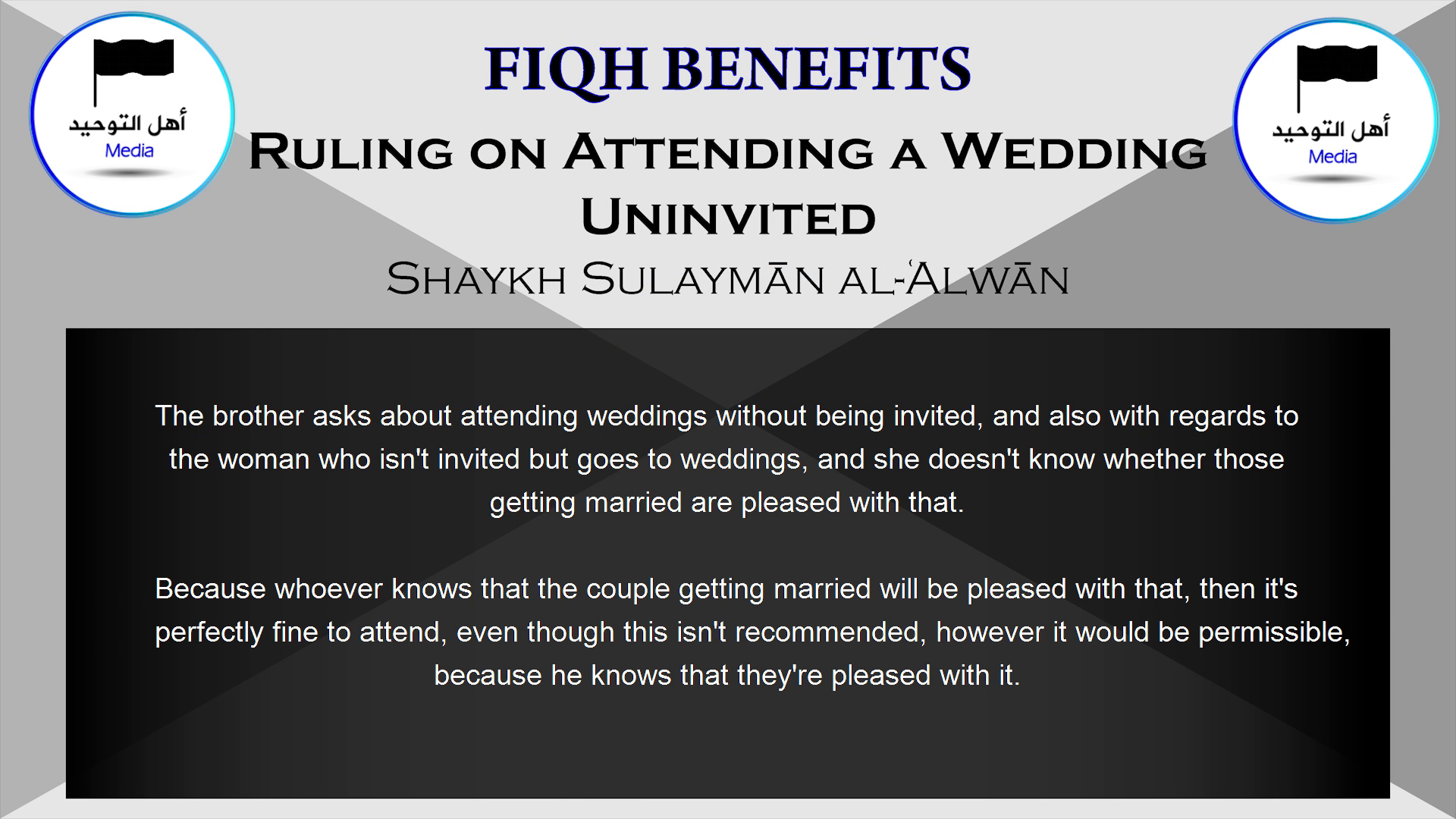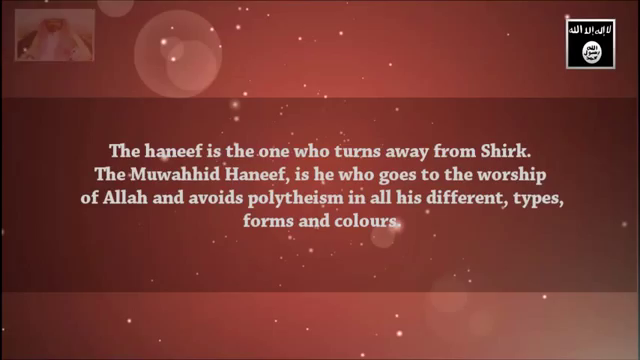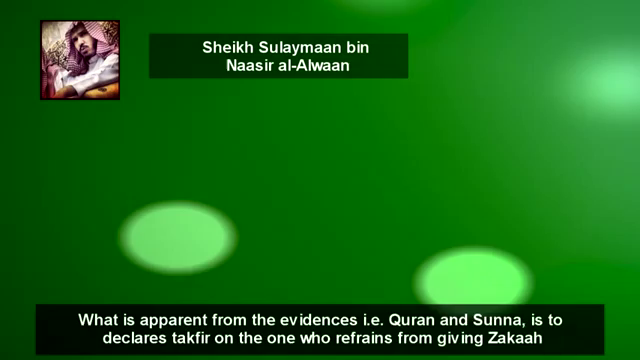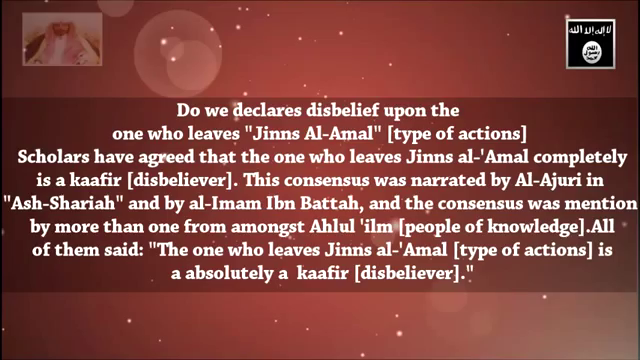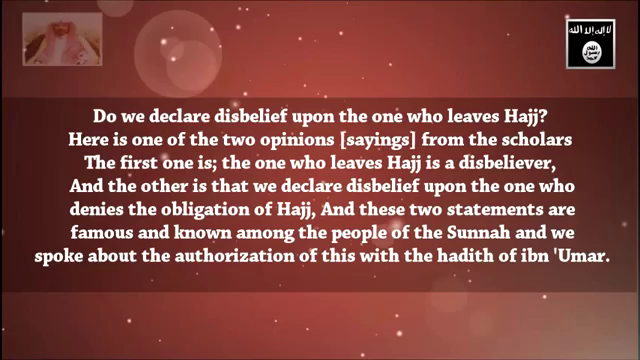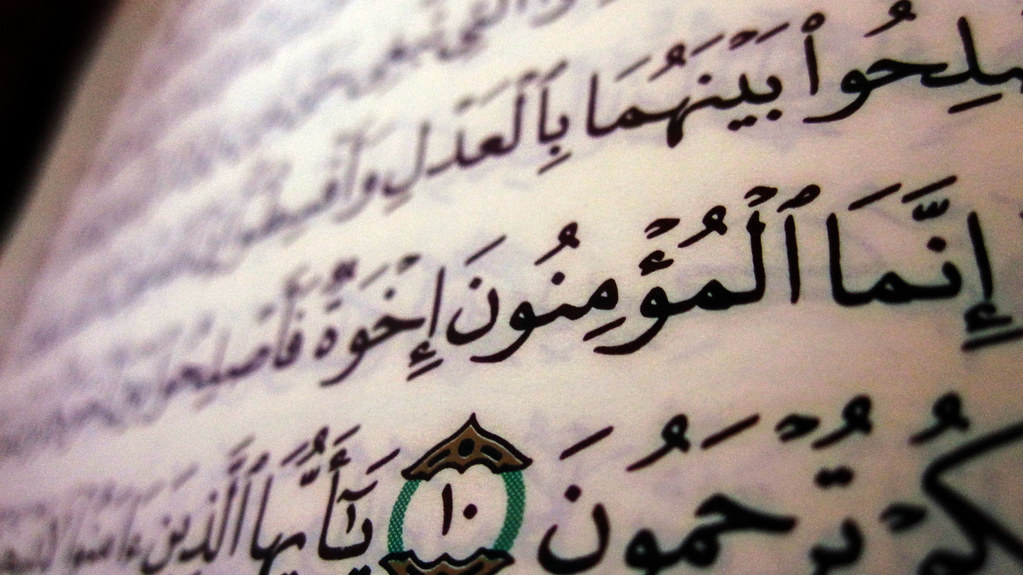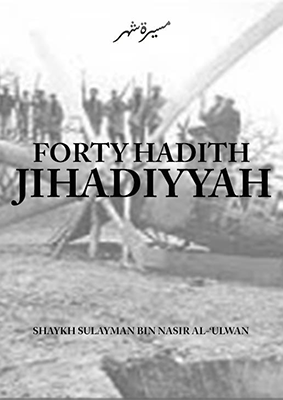Latest Lectures
Sulayman Ibn Nasir Ibn ‘Abdillah al-‘Alwan was born and raised in the city of Buraydah in the province of al-Qaseem, in the Kingdom of Saudi Arabia, in the year 1389 H. He was one of nine sons; three older brothers and five younger. Shaykh Sulayman began his studies in the year 1404H when he was fifteen years old, in his third year of middle school. Upon completion of middle school, he spent no more than fifteen days in high school before deciding to leave the institution and completely enter the study of the Shari’ah sciences and Islamic knowledge, by studying from the scholars and reading and reviewing their books. He was married in the year 1410H and has three sons, the oldest of which is ‘Abdullah, who is nine years old.
During his early days, he demonstrated an impressive ability to memorize and showed a very deep understanding of the writings of the various sciences of the Shari’ah. And from the origins of his exclusive studies, Shaykh Sulayman has spent most of his days in reading, memorizing and reviewing the books of knowledge.
Initially, he finished memorising the Qur’an in 1407 H then he focused upon the writings of Ibn Taymiyyah, Ibn al-Qayyim, the Imams of Najd, Ibn Rajab, the Sirah [Prophetic Biographical Accounts] of Ibn Hisham and “Al-Bidiyah Wan-Nihiyah” of Ibn Kathir and he would review with the scholars, depending on their areas of expertise. He used to visit four different scholars daily; one after Fajr, another after Dhuhr, another after Maghrib and another after Isha’. And he stayed upon this routine day in and day out, except for Fridays, until he began studying from all the schools of Fiqh [Madhahib] and the selected opinions of Ibn Taymiyyah, Ibn al-Qayyim and Ibn Hazm may Allah be be merciful to them. When asked about how much time he spends in reading, memorizing and reviewing, the Shaykh responded, “A little more than fifteen hours per day.”
In the year 1410H, he began giving lessons in his home and in 1411H he began giving lessons in the Mosque during the week after Fajr, Dhuhr and Maghrib, except on Fridays.
This has been summarized from the short treatise entitled, “Safahat Min Hayat Fadhilat Ash-Shaykh Sulayman Ibn Nasir al-‘Alwan”, [Pages from the Life of the Virtuous Shaykh Sulayman Ibn Nasir al-‘Alwan], prepared by Abu Muhammad Yusuf as-Salih. As well as things added by the translators that have happened to the Shaykh since the publishing of his above mentioned biography.
When he traveled to al-Madinah, he sat with Shaykh Hammad al-Ansari, who issued him the license [Ijazah] to teach the Six Books [of Hadith] as well as “Musnad Ahmad”, “Muwatta’ Imam Malik ,”the two Sahihs of Ibn Khuzaymah and Ibn Hibban and the two Musannafs of ‘Abdur-Razzaq and Ibn Abi Shaybah. He also issued him the license of the Tafsir of Ibn Jarir and “Tafsir Ibn Kathir”. And in grammar, “al-Alfiyyah” of Ibn Malik and many of the books of jurisprudence [Fiqh]. And during this visit, he heard the Shaykh narrate the Hadith, “The Most Merciful [Ar-Rahman] has mercy upon those who show mercy [to others].” And this was the first Hadith he heard with the chain of narration, from the scholar’s lips, extending all the way back to the Messenger of Allah (صلى الله عليه وسلم). This took place on 18/8/1413H. Later, he traveled to Makkah and sat with the scholars there and received similar licenses to teach in the other books of the Sunnah, Tafsir and jurisprudence.
He returned to giving his lessons in the Mosque, offering lessons in the books of Hadith, which included:
- Sahih al-Bukhari
- Jami’ at-Tirmidhi
- Sunan Abi Dawud
- Muwatta’ Malik
- Bulugh al-Maram
- ‘Umdat al-Ahkam
- Al-Arba’in an-Nawawiyyah [An-Nawawi’s Forty Hadith]
He also gave lessons in the classification and terminology of Hadith [Mustalah Al-Hadith] as well as their defects [‘Ilal], jurisprudence, grammar and Tafseer. And from the lessons, which he gave from the books of belief [‘Aqidah], were:
- Al-‘Aqidah at-Tadmuriyyah
- Al-‘Aqidah al-Hamawiyyah
- Al-‘Aqidah al-Wasitiyyah of Shaykh al-Islam Ibn Taymiyyah
- Kitab at-Tawheed ”of Muhammad Ibn ‘Abdil-Wahhab
- Ash-Shari’ah from al-Ajurri
- As-Sunnah by ‘Abdullah Ibn Ahmad
- As-Sunnah by Ibn Nasr
- Al-Ibanah by Ibn Battah
- As-Sawa’iq and an-Nuniyyah both by Ibn al-Qayyim.
Students have reported that the Shaykh taught the courses from memory without any written material.
However, the Shaykh was later prevented from offering lessons in the Mosque by the authorities due to undeclared reasons. During this period, Shaykh Ibn Baz, may Allah be merciful to him, made several attempts, from writing to the authorities and asking them to allow the Shaykh to resume his lessons in the Mosque. But these pleas were ignored time after time. And beforehand, Shaykh Ibn Baz urged the Shaykh to remain patient and to continue giving his lessons. And he praised his books in a letter, which he wrote with the following text:
From ‘Abdul-‘Aziz Ibn ‘Abdillah Ibn Baz, to the respected son, the virtuous Shaykh Sulayman Ibn Nasir al-‘Alwan, may Allah allow him to attain His pleasure and increase him in knowledge and faith [iman]. Amin. As-Salamu ‘Alaykum Wa Rahmatullahi Wa Barakatuh, To proceed:
‘I have examined some of your writings and read some of what you have written in the refutation of Ibn al-Jawzi and as-Saqqaf and I became very happy with that. And I praised Allah –Glorified be He –for what he gave you from the comprehension of the religion (Deen) and your holding steadfast to the predecessors’ beliefs (Salafi ‘Aqeedah) and teaching it to the students and refuting those who oppose it. So I ask Allah to reward you with goodness and multiply your rewards and increase you in knowledge and guidance and make ourselves and you and the rest of our brothers, to be among His righteous slaves and His successful party (Hizb). Verily, He is the Guardian (Wali) of that and the One who is capable to do so. And we advise you with the fear of Allah –Glorified be He – and putting forth all efforts in teaching the people in Shari’ah-based knowledge and insiting them to act upon it and emphasizing the correct issues in belief (‘Aqeedah) and clarifying them to the students, as well as others, in your specific and general lessons. And encouraging the people, from the students and others, in reading the Noble Qur’an often, while contemplating its meanings and acting upon it. And emphasizing the Sunnah of the Messenger which is confirmed from him, and the benefitting from it, because it is the Secondary Revelation and it is the explanation of the Book of Allah and a clarification for that which might not be apparent from its meaning. May Allah guide your steps and increase you in beneficial knowledge and righteous deeds and may He keep ourselves and you, steadfast upon the guidance and make ourselves and you, from His successful party (Hizb) and His fearful allies (‘Awliyaa’) and from the callers to Him who are upon sure-sightedness (Basirah). Verily, He is Generous and Bountiful.Wa As-Salamu ‘Alaykum Wa Rahmatullahi Wa Barakatuh
417/5/11التاريخ 840/خ :الرقم
The Head Cleric (Mufti) of the Kingdom of Saudi Arabia and the President of the Council of Senior Scholars and the Administration of Knowledge-Base Research and Legal Verdicts. #840‘ –dated 11/5/1417H.
The Shaykh was then allowed to give the lessons to the general public in the Mosques again on the date 6/3/1424H. after seven years of being prevented.
Shaykh Hamud bin Uqla ash-Shu'aybi said,
I have never seen a person in the Kingdom who has assembled such a memory with such understanding outside of Shaykh Sulayman al-’Alwan.
It was narrated that Shaykh Sulayman al-‘Alwan had completed memorization of the Qur’an by the time he was 18, and had memorized the texts of and studied the explanations of the following:
- Kitab at-Tawheed
- Al-Wasitiyyah
- Al-Hamawiyyah
- Al-Bayquniyyah
- Umdat al-Ahkam
- Al-Ajrumiyyah
- Nukhbat al-Fikr
- Ar-Rahbiyyah
- Bulugh al-Maram
- Al-Usul ath-Thalathah
- Al-Waraqat
- Mulhat al-I’rab
- Al-Alfiyyah
- Kashf ash-Shubuhat
As well as the six books of Hadith of al-Bukhari, Muslim, at-Tirmidhi, Abu Dawud, an-Nasa’i, and Ibn Majah by the time he was in his twenties. See: ‘Imatat al-Litham fi Sirat ash-Shaykh Sulayman al-‘Alwan’
Shaykh Sulayman learned an impressive number of Ahadith with their chain of transmission, so much so that Shaykh Ibn ‘al-Uthaymeen (رحمه الله) would contact him on the authentication of certain Ahadith when he had no time to do research, and also to praise the ‘ilm of Shaykh Sulayman. See Life of Ibn Uthaymeen p.86-87
The Shaykh has also faced some opposition from his contemporaries regarding some of the jurisprudence related opinions he holds, such as the purity [Taharah] of blood and alcohol [i.e. that they are not essentially filthy [Najasah] and the permissibility of the sexual defiled one, reciting [but not touching] the Qur’an, and other things of this nature. And one time, the Shaykh was imprisoned for a treatise he wrote concerning the innovation [Bid’ah] of holding congratulatory celebrations for those who complete the memorization of the Qur’an, due to his opinion that these celebrations were not known at the time of the Prophet nore the time of his companions [Sahabah] nor the Imams of those who succeeded them [Tabi’in] nor the four Imams. And this was one of the things that these generations could have done as there was nothing to prevent them from that except that the Messenger of Allah (صلى الله عليه وسلم) said, “Whoever innovates something into this matter of ours that which is not from it, then it is rejected.” [Agreed upon, from the Hadith of ‘A’ishah, may Allah be pleased with her] So he was imprisoned along with others, who held the same opinion, in Riyadh, near the end of Dhul-Hijjah in 1407, for eighteen days.
From the published books of the Shaykh are:
- Tanbih al-Akhyar ‘Ala ‘Adam Fina’ an-Nar [Reminding the Righteous, Concerning the Eternity of the Hellfire]
- At-Tibyan Fi Sharh Nawaqidh al-Islam [The Clarification Regarding the Explanation of ‘The Nullifications of Islam]
- Sharh Bulugh al-Maram [Explanation of Bulugh Al-Maram]
- Ahkam Qiyam al-Layl [Regulations of the Night Prayer]
- Al-Istinfar Lith-Thabb ‘An as-Sahabah al-Akhyar [Calling to Arms in Defense of the Righteous Companions]
- Ala Inna Nasrullahi Qarib [Verily, the Victory of Allah is Near]
As well as ten others. And from the yet-to-be-published writings, are:
- Sharh al-Usul ath-Thalathah [Explanation of ‘The Three Fundamentals]
- Sharh Kitab at-Tawheed [Explanation of ‘The Book of Tawhid]
- Hukm as-Salat ‘Ala al-Mayyit al-Gha’ib [The Ruling Concerning the Prayers upon the Absent Deceased]
- Hukm al-’Ihtifal Bil-A‘yad [Celebrating the Various Celebrations [of others]
as well as four others.
His audio recordings :
- Sharh Tadjrid at-Tawheed al-Mufid
- Sharh al-'Aqeedah al-Wassitiyyah
- Sharh Sahih al-Bukhari (Kitab Bad’ al-Wahy and Kitab al-Iman)
- Sharh Sunnan at-Tirmidhi (Kitab at-Taharah and Kitab as-Siyyam)
- Sharh ar-Rawd al-Murbi' (Kitab al-Hajj)
There are many audio recordings that are with his students and are not released on the net (like his Sharh Kitab at-Tawheed because it is not allowed to be spread) or which are released only as notes (like Sharh of Bulugh al-Maram).
Shaykh Sulayman al-'Alwan was arrested on 3/9/1425 H. (2004 Gregorian) for refusing to issue a fatwa on government orders. He was imprisoned in inhumane conditions, leaving his family without any news; he was mostly kept in isolation in cold cells made voluntarily [because of] air conditioners until December 2012 when he was released. Sulayman al-'Alwan fell seriously ill (diabetes) during his incarceration, which required care which was granted after a campaign of support. He also had the opportunity to go out to visit his sick father during Ramadan 2008 for 3 days, [during which] many students took the opportunity to visit Shaykh Sulayman.
During his detention, he was offered the post of Mufti and a television channel provided he revisit some of his words, but he refused.
Shaykh Sulayman is one of the most respected scholars of our time. He has donated his time to educate the Ummah and advise Muslims, especially the resistant. He has always defended the sound Islamic belief of Ahl as-Sunnah wa al-Jama'ah against all aberrations and innovations in learning not to rush into excommunication but above all against the widespread heresy of Irja'. Through his writings and audio he defends the Shari'ah of Allah and unveils the case of illegitimate governments which rule by other than Allah's law. He has multiplied his interventions which have been going on since his release. He spreads knowledge via the recordings of his lectures which were published on YouTube. Indeed, because [of this] knowledge, the Shaykh’s words have been widely propagated lately via social networks such as Facebook and especially Twitter, a microblogging site in which his son ‘Abd al-Malik shared the words of his father Sulayman (with the hashtag قال_والدي#). Shaykh Sulayman invited Shaykh al-Fawzan to a debate with the condition that it would be broadcast live, but did not receive any reply.
Recently, the Shaykh was again indicted for his Da’wah. Shortly before his trial, the Shaykh was banned from teaching and his son from tweeting the forbidden knowledge of his father.
On 3 October 2013, he was sentenced to 15 years in prison by Judge Fahd al-Humaydani for disobedience to the "Wali al-Amr" for defending Shaykh Nasir al-Fahd, for supporting the Iraqi resistance, and for giving a fatwa on the obligation of jihad in Syria. Shaykh al-'Alwan told his son that he had found 70 contradictions with the Shari'ah in the judgment that was made against him.
When the verdict was delivered for 15 years, he was offered to say that the leaders of Saudi Arabia are the legitimate leaders of Muslims and that Saudi courts are governed by the law of Allah and not by the whims of kings in order to be freed. He replied,
Even if you cut off my head, I will not say that!
Sulayman al-'Alwan swayed the judge [to his side] on some charges, which fled the debate out of the room.
Upon leaving the court Shaykh Sulayman was smiling, the Muslims that came to support him thought that he was acquitted, and sang anashid in his honour. Our Shaykh was happy with what Allah had decreed for him.
A support campaign was launched via the hashtag مؤامرة_محاكمة_العلوان# with many Shuyukh arguing for Shaykh Sulayman al-’Alwan, among them:
- Dr. 'Iyad al-Qunaybi
- Shaykh al-Muhadith ‘Umar al-Hadushi
- Shaykh Ahmad Musa Jibril
And may the Peace and Blessings of Allah, be upon our Final Prophet, Muhammad and his family and companions and those who follow them in truth until the Final Hour. And all Praise is due to Allah, the Lord of all that exists.

